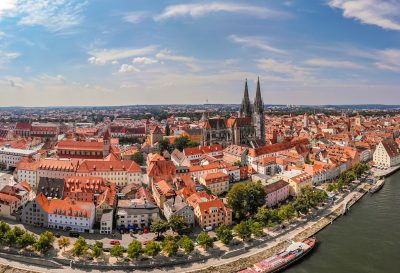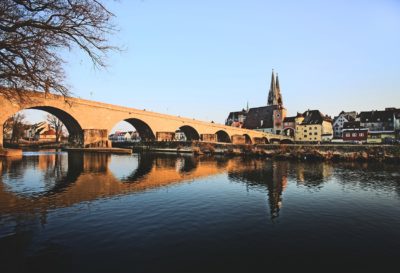
NEWS REGENSBURG
Peer-to-peer workshop in Regensburg
Join the Regensburg peer-to-peer workshop, which will take place on 30 October 2021, from 10:00-12:00 online.
Regensburg is a small to mid-sized city with zero unemployment and a very active population. The city is a mix of student city and vibrant economic centre. Commuters represent a large share of the city population (75,000 commuters per day). This heterogeneity entails different and often conflicting mobility needs, in a city with a strong historical character. The city has an extensive bus network, includin an e-bus fleet.
Regensburg has been very active in exploring various novel mobility services and concepts. One of the wider ones includes bike-sharing, with several hundred shared bicycles to start operations in 2019. The current car-sharing systems is planned to expand, and an autonomous people mover is planned along a predefined area. In addition, a smart parking application has been launched.
While the level of air pollution is not as high as in other cities, air quality is an increasing concern and is considered as one of the main priorities of the city, together with the preservation and regeneration of the city centre, listed as UNESCO World Heritage.
The main objective of the Regensburg case study is to have a reliable model for deriving scenario outputs and guiding evidence-driven policy input by integrating the new mobility services into the existing model. Some of the questions to be addressed in this case study are: determining the optimal pricing strategies of the bike-sharing system and quantifying the impact of the bike-sharing system in removing car traffic.

Join the Regensburg peer-to-peer workshop, which will take place on 30 October 2021, from 10:00-12:00 online.

Experts from Regensburg gave us an update about recent developments in the Bavarian city.

We spoke officials from Regensburg about the reasons for joining MOMENTUM, post-COVID-19 mobility plans and the new municipal government.

Regensburg is shifting from a car-centric mobility concept towards sustainable urban planning, including emerging mobility solutions.
This website uses cookies so that we can provide you with the best user experience possible. Cookie information is stored in your browser and performs functions such as recognising you when you return to our website and helping our team to understand which sections of the website you find most interesting and useful.
Strictly Necessary Cookie should be enabled at all times so that we can save your preferences for cookie settings.
If you disable this cookie, we will not be able to save your preferences. This means that every time you visit this website you will need to enable or disable cookies again.
